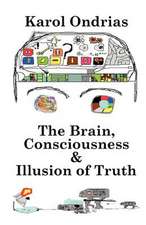Foundations for Clinical Neurology
Autor Robert Laurenoen Limba Engleză Paperback – 14 sep 2017
Preț: 383.50 lei
Preț vechi: 479.31 lei
-20% Nou
Puncte Express: 575
Preț estimativ în valută:
73.41€ • 79.76$ • 61.70£
73.41€ • 79.76$ • 61.70£
Carte disponibilă
Livrare economică 20-26 martie
Preluare comenzi: 021 569.72.76
Specificații
ISBN-13: 9780190607166
ISBN-10: 0190607165
Pagini: 218
Dimensiuni: 155 x 231 x 13 mm
Greutate: 0.38 kg
Editura: Oxford University Press
Colecția OUP USA
Locul publicării:New York, United States
ISBN-10: 0190607165
Pagini: 218
Dimensiuni: 155 x 231 x 13 mm
Greutate: 0.38 kg
Editura: Oxford University Press
Colecția OUP USA
Locul publicării:New York, United States
Recenzii
Foundations for Clinical Neurology is an erudite and informative book filled with the anecdotes and wisdoms of a keenly observant neurologist of vast clinical experience. It touches on many subjects of interest to the clinical neuroscientist. Dr. Laureno is widely read and has an inquisitive mind. He muses over how the ontology and phylogeny of the nervous system produces the wraparound course of the radial and peroneal nerves, how notochord remnants relate to degenerative disc disease, how bipedalism leads to meralgia paresthetica, why we hiccup and why alligators dont get dizzy. The book is filled with the clinical wisdom and aphorisms of such luminaries as Maurice Victor, Asa Wilborn, Jerome Posner, Joseph Foley, James Corbett, David Zee, Miller Fisher and Raymond Adams. I wish that Dr. Laureno had written this book years ago; I would have been a better neurologist for reading it.
Neurologists like pearls and this book is a necklace. Each chapter is filled with helpful hints and historical notes gleaned from mentors, friends and experiences over a thoughtful career. It is both a fun and educational read.
Foundations for Clinical Neurology is a satisfying immersion into the neurology culture. Laureno astutely considers the practiced approach to the patient (and flustered family) at the bedside, the subjectivity of examination, the benefits of organization, the fading eponym, the insufficient rating scales and ever changing terminology down to the single protein. Symmetry and asymmetry, disproportionality, all those crossed fibers, causality, problems in localization and how MRI has changed everything are discussed with verve. Readers will find a great exposure of the stigmata of neurology. Laureno does not shy away from iatrogenic neurology as a result of doing too much or too little. There are many remembrances of times past with omnipresent mentor musings?will we still have those tomorrow? An engaging, good-natured work that takes us beyond the traditional textbook and invites us to rethink what we do.
Neurologists like pearls and this book is a necklace. Each chapter is filled with helpful hints and historical notes gleaned from mentors, friends and experiences over a thoughtful career. It is both a fun and educational read.
Foundations for Clinical Neurology is a satisfying immersion into the neurology culture. Laureno astutely considers the practiced approach to the patient (and flustered family) at the bedside, the subjectivity of examination, the benefits of organization, the fading eponym, the insufficient rating scales and ever changing terminology down to the single protein. Symmetry and asymmetry, disproportionality, all those crossed fibers, causality, problems in localization and how MRI has changed everything are discussed with verve. Readers will find a great exposure of the stigmata of neurology. Laureno does not shy away from iatrogenic neurology as a result of doing too much or too little. There are many remembrances of times past with omnipresent mentor musings?will we still have those tomorrow? An engaging, good-natured work that takes us beyond the traditional textbook and invites us to rethink what we do.
Notă biografică
Dr. Laureno chairs the neurology department at Medstar Washington Hospital Center. He is a professor of neurology at Medstar Georgetown University Hospital and Georgetown University School of Medicine. He is the author of Raymond Adams: A Life of Mind and Muscle (OUP, 2009).

























